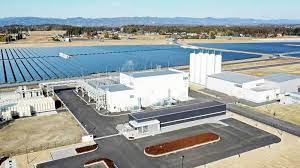The world’s largest green hydrogen plant has been planned to be constructed in Oman in a move to make the country a leader in renewable energy technology. The country has announced that they plan to construct the plant in the Al Wusta governorate on the Arabian Sea and will begin construction in 2028. The plant will be constructed in stages and they aim to make it operate at full capacity by 2038. It will be powered by 25 GW of both solar and wind energy. Once online, the US$30 billion plants will use renewable energy to split water in an electrolyzer to produce green hydrogen, which is able to replace fossil fuels without producing carbon emissions.
Also Read: India awards worlds largest solar project bid at US$6bn
The world’s largest green hydrogen plant will be constructed by both the state-owned oil and gas company OQ, Enertech, the Kuwait-based energy investor, and InterContinental Energy, the Hong Kong-based renewable hydrogen developer. Most of the green hydrogen will be exported to Europe and Asia either as hydrogen or converted into green ammonia, which is easier to ship and store. The plant aims to produce up to 10 million tonnes of green ammonia and 1.8 million tonnes of green hydrogen a year.
“Most green hydrogen products will not be competitive for at least another decade,” said Falko Ueckerdt, a senior scientist at the Potsdam Institute for Climate Impact Research, who sees the Oman project as “a sign that investors anticipate large future demands for hydrogen-based fuels after 2030”. While electrification is the most efficient way of decarbonizing most sectors, it is limited when it comes to energy-intensive industries such as steel, aviation, chemicals, and shipping and green hydrogen will be vital to help fill these gaps, said the International Energy Agency in its report published this week. The Agency called for an end to fossil fuel investments if governments are serious about climate commitments.
92%

Leave a Reply